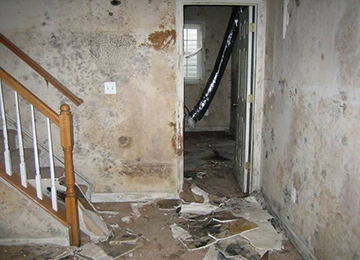The indoor air quality in your home or office may appear to be the least of your problems after a flood. However, failure to remove contaminated materials and take steps to reduce moisture and humidity levels can present serious long-term health risks.
Standing water and wet materials can become a breeding ground for microorganisms: bacteria, mold, and viruses. They can cause disease, trigger allergic reactions, and continue to damage materials long after the flood waters recedes. These microorganisms can become airborne and possibly inhaled. When floodwaters contain sewage or decaying animal carcasses, infectious diseases are also a concern. Even if the water appears clean, microorganisms can cause allergic reactions in sensitive individuals.
We recommend that if your home or business has been affected by flooding, an assessment should be completed by a competent professional. These assessments identify health risks and structural damage, which may not be obvious. Professional assessments can also provide recommendations regarding what materials should be removed and what can be cleaned in place. The report can also address any required structural repairs.
Building materials should also be tested for the presence of asbestos fibers.
Even today, commercial buildings and homes may incorporate asbestos. Asbestos is a mineral fiber used, particularly in the past, in a variety of building construction materials for insulation and as a fire retardant. Products that may contain asbestos include pipe and furnace insulation materials; asbestos and cement shingles, siding, and roofing; millboard; resilient floor tiles; the backing on vinyl sheet flooring and floor tile adhesives; soundproofing or decorative material; patching and joint compound; certain fireproof gloves, and stove pads. Asbestos can cause lung cancer, mesothelioma (a cancer of the chest and abdominal linings), and asbestosis (irreversible lung scarring that can be fatal). The risk of lung cancer increases with the number of fibers inhaled. Asbestos, when damaged by a flood, should be repaired or removed by a professional.
As a final note, we recommend that you only hire licensed, experienced professionals. Unfortunately, natural disasters can create opportunities for con artists to take advantage of those in need. Always ask to see appropriate contractor or engineer licenses and proof of insurance coverage for anyone you hire. Professional engineers and asbestos professionals are regulated professions in all states.
If you need emergency support for any of the issues we’ve described, ECS has dedicated a webpage to help our friends and neighbors in South Carolina recover from this natural disaster and its aftermath. To contact an ECS professional, just click here.

